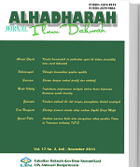PENERIMAAN DIRI BAGI PENYANDANG DISABILITAS NETRA
DOI:
https://doi.org/10.18592/alhadharah.v18i2.3380Keywords:
Self-acceptance, people with visual disabilitiesAbstract
People with visual disabilities are someone who has a sense of vision (both) do not function as channels of information in their activities as normal people. This means that a blind person has a disability in the sense of vision so that the vision function is not the same as people in general. Disabilities in persons with visual impairments have a major influence on daily life.The physical limitations of people with visual impairments hamper any activities that are normally carried out by normal (seeing) people. These limitations affect the mental condition of persons with blind disabilities, for example a feeling of inferiority towards the physical possessed, then fear and insecurity about their potential, this is a problem that must be faced by persons with blind disabilities.Persons with disabilities who are blind with imperfections of their sense of sight will naturally experience various problems including those related to their self-acceptance, because it is not easy for those with disabilities to be able to accept themselves, and will require a long time, until it is embedded in him that experiencing blindness is not the end of everything, and with limitations on their sense of sight they still have a strong desire and determination to realize their desires, and are able to adapt themselves to their circumstances and environment by seeing themselves as they really are and recognizing themselves as they really are.Persons with visual impairments, whether innate or not, who have self-acceptance they will have the confidence to face problems, have the same degree as others, can receive praise, be able to accept criticism, able to accept limitations and strengths that exist in themselves, have a positive assessment of himself, able to control his emotional state, and be responsibleReferences
Arthur S. Reber, Emily S. Reber, The Penguin Dictionary of Psychology, Terj. Yudi Santoso, Kamus Psikologi Indonesia, Pustaka Pelajar, Yogyakarta, 2010.
Calhoun, J. F, &Acocella, J. R., Psychology of adjustment and human relationship. Mc McGraw-Hill Publishing Company, New York, 1990.
Chalidah, Ellah Siti. Departemen Pendidikan Nasional. Terapi Permainan Bagi Anak Yang Memerlukan Layanan Pendidikan Khusus. Jakarta: Direktorat Pembinaan Pendidikan Tenaga Kependidikan Dan Ketenagaan Keperguruan Tinggi, 2005.
Chaplin, J.P. Kamus Lengkap Psikologi. Jakarta: Raja Grafindo Persada, 2005.
Dewi, D. S. Kajian tentang psychological well being pada anak tunanetra di sekolah menengah atas luar biasa. Psychology & Humanity, 2016.
Endra K. Prihadhi, My Potency, PT Elex Media Komputindo, Jakarta, 2004.
Geinofam, Mengasuh & Mensukseskan Anak Berkebutuhan Khusus, Gerailmu, Yogyakarta, 2010.
Habib Syarief Muhammad Alaydrus, Agar Hidup Selalu Berkah Meraih Ketentraman Hati dengan Hidup Penuh Berkah, Mizan, Bandung, 2009,
Hurlock, EPersonality development, McGraw-Hill Publishing Company, Tokyo,1978.
John M. Echols, An English-Indonesian Dictionary, Terj. Hassan Shadily, Kamus Inggris Indonesia, Gramedia Pustaka Utama, Jakarta, 1976.
Meity Taqdir Qodratillah, Kamus Bahasa Indonesia, Badan Pengembangan dan Pembinaan Bahasa, Kementrian Pendidikan dan Kebudayaan, Jakarta, 2011.
Muk Kuang, Amazing Life, PT Gramedia Pustaka Utama, Jakarta, 2010.
Neil Aldrin, Design Your Life, Puspa Swara, 2012.
Pradopo, S. Pendidikan Untuk Anak-anak Tunanetra Untuk Guru SGPLB, Departeman Pendidikan Dan Kebudayaan, Jakarta, 1977
Robert Holden, Sucess Intelligence: Timeless Wisdom for a Manic Society, Terje. Yuliani Liputo, Success Intelligence, Mizan, Bandung, 2007.
Schultz, Psikologi Pertumbuhan: model-model kepribadian sehat (Yogyakarta: Kanisius, 1991.
Sutjihati Soemantri., Psikologi Anak Luar Biasa, PT Refika Aditama, Bandung, 2012.
Tentama, F. Berpikir positif dan penerimaan diri pada remaja penyandang cacat tubuh akibat kecelakaan, Humanitas, 2010.
Theo Riyanto, Jadikan Dirimu Bahagia, Kanisius , Yogyakarta, 2006.
Eko Riyadi dkk., Vulnerable Groups, Kajian dan Mekanisme Perlindungannya, PUSHAM UII,Yogyakarta. 2012.
Xu, Wei., Marcus A, Zhang Q, Liu X. The Mediating Effect of Self-Acceptance in the Relationship Between Mindfulness and Peace of Mind. JournalMindfulness (dipublikasikan).Department of Psychology and Neuroscience. USA: Duke University, 2015.
Downloads
Published
How to Cite
Issue
Section
License
Authors retain copyright and grant the journal the right of first publication, with the work simultaneously licensed under the Creative Commons Attribution-NonCommercial 4.0 International Public License (CC BY-NC 4.0). This license allows reusers to distribute, remix, adapt, and build upon the material in any medium or format for noncommercial purposes only, provided that proper attribution is given to the original creator.







